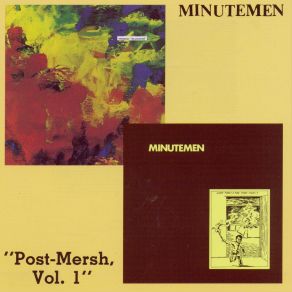Post-Mersh, Vol. 1
Download links and information about Post-Mersh, Vol. 1 by Minutemen. This album was released in 1987 and it belongs to Rock, Indie Rock, Punk, Alternative genres. It contains 36 tracks with total duration of 41:46 minutes.

|
|
|---|---|
| Artist: | Minutemen |
| Release date: | 1987 |
| Genre: | Rock, Indie Rock, Punk, Alternative |
| Tracks: | 36 |
| Duration: | 41:46 |
| Buy it NOW at: | |
| Buy on iTunes $9.99 | |
| Buy on Amazon $8.99 | |
Tracks
[Edit]| No. | Title | Length |
|---|---|---|
| 1. | Search | 0:53 |
| 2. | Tension | 1:20 |
| 3. | Games | 1:04 |
| 4. | Boiling | 0:57 |
| 5. | Disguises | 0:48 |
| 6. | The Struggle | 0:41 |
| 7. | Monuments | 0:51 |
| 8. | Ruins | 0:49 |
| 9. | Issued | 0:40 |
| 10. | The Punch Line | 0:41 |
| 11. | Song for El Salvador | 0:32 |
| 12. | History Lesson | 0:38 |
| 13. | Fanatics | 0:31 |
| 14. | No Parade | 0:51 |
| 15. | Straight Jacket | 0:59 |
| 16. | Gravity | 0:57 |
| 17. | Warfare | 0:55 |
| 18. | Static | 0:53 |
| 19. | Bob Dylan Wrote Propaganda Songs | 1:28 |
| 20. | One Chapter In the Book | 1:02 |
| 21. | Fake Contest | 1:43 |
| 22. | Beacon Sighted Through Fog | 1:00 |
| 23. | Mutiny In Jonestown | 1:08 |
| 24. | East Wind Faith | 2:08 |
| 25. | Pure Joy | 1:29 |
| 26. | 99 | 1:00 |
| 27. | The Anchor | 2:33 |
| 28. | Sell or Be Sold | 1:44 |
| 29. | The Only Minority | 1:00 |
| 30. | Split Red | 0:53 |
| 31. | Colors | 2:05 |
| 32. | Plight | 1:37 |
| 33. | The Tin | 1:08 |
| 34. | Life As a Rehearsal | 1:34 |
| 35. | This Road | 1:24 |
| 36. | Polarity | 1:50 |
Details
[Edit]The first volume of the Post-Mersh compilations brings together the first two Minutemen albums: 1981’s The Punch Line and 1983’s What Makes a Man Start Fires?. This was the period in which the San Pedro, Calif., trio played music that was marvelously scrappy but brimming with creative ambition. The first 18 songs (from The Punch Line) fly by in 15 minutes flat. Unlike on later Minutemen albums, Mike Watt sings half the tunes here, including the classic “Search.” In these early songs, you can watch the band push restlessly against every punk dictum, searching for alternate angles to a genre that had quickly become codified. By the time of What Makes a Man Start Fires?, they'd become elder statesmen of the burgeoning indie rock underground. George Hurley’s drums are no less a melodic force than Watt’s bass or D. Boon’s guitar, and in “The Only Minority” and “This Road” the three instrumental voices are coiled and intertwined. The songs sputter with frustration and political intensity, but they also exude, in the words of one song, “Pure Joy.”